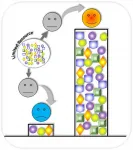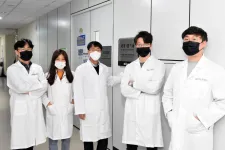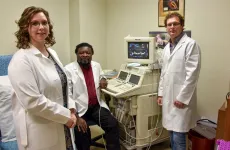(Press-News.org) Higher blood pressure at night than in daytime may be a risk factor for Alzheimer's disease in older men. This is suggested by a new study from researchers at Uppsala University, now published in the journal Hypertension.
'Dementia' is an umbrella term used to describe a category of symptoms marked by behavioural changes and gradually declining cognitive and social abilities. Numerous factors, including hypertension (high blood pressure), affect the risk of developing these symptoms.
Under healthy conditions, blood pressure (BP) varies over 24 hours, with lowest values reached at night. Doctors call this nocturnal blood pressure fall 'dipping'. However, in some people, this BP pattern is reversed: their nocturnal BP is higher than in daytime. This blood pressure profile is known as 'reverse dipping'.
"The night is a critical period for brain health. For example, in animals, it has previously been shown that the brain clears out waste products during sleep, and that this clearance is compromised by abnormal blood pressure patterns. Since the night also represents a critical time window for human brain health, we examined whether too high blood pressure at night, as seen in reverse dipping, is associated with a higher dementia risk in older men," says Christian Benedict, Associate Professor at Uppsala University's Department of Neuroscience, and senior author of the study.
To test this hypothesis, the researchers used observational data from one thousand Swedish older men, who were followed for a maximum of 24 years. The included men were in their early seventies at the beginning of the study
"The risk of getting a dementia diagnosis was 1.64 times higher among men with reverse dipping compared to those with normal dipping. Reverse dipping mainly increased the risk of Alzheimer's disease, the most common form of dementia," says Xiao Tan, postdoctoral fellow from the same department and first author of this research.
"Our cohort consisted only of older men. Thus, our results need to be replicated in older women," concludes Benedict.
According to the researchers, an interesting next step would be to investigate whether the intake of antihypertensive (BP-lowering) drugs at night can reduce older men's risk of developing Alzheimer's disease.
INFORMATION:
A new process for inserting synthetic gene circuits into host cells, developed by a team of bioengineers at Arizona State University, has broad implications for improving the effectiveness of a range of disease therapies.
Synthetic biology is an interdisciplinary research field that uses engineering principles to create biological components that don't exist in the natural world. These synthetic components mimic naturally evolved organisms, but are customized to fight disease, including cancer.
A paper recently published in Nature Communications, "Winner-Takes-All Resource Competition Redirects Cascading Cell Fate Transitions," outlines how gene circuits can be reconfigured so that they do not overwhelm the host cells.
"We ...
In the early months of the COVID-19 pandemic, there was an almost 80% decrease in primary care office visits in Ontario and a 56-fold increase in virtual visits, found new research in CMAJ (Canadian Medical Association Journal).
"Initial reports from primary care providers during the pandemic in both Canada and the United States showed major disruptions to care, decreased payments, challenges keeping offices functioning, lack of personal protective equipment and widespread uptake of virtual care, but we didn't know how COVID-19 had affected in-person office visits," says ...
People living in regions with high levels of outdoor artificial light at night may face a higher risk of developing thyroid cancer. The finding comes from a study published early online in END ...
A new national survey of more than 2,000 Americans by END ...
A method that instructs immune system cells to help repair damaged tissues in the intestine has been developed by researchers at KU Leuven and Seoul National University. This opens the way for more effective treatment of inflammatory bowel disease, including ulcerative colitis and Crohn's disease. The study was carried out on humans and mice.
When functioning correctly, the immune system protects against harmful agents such as bacteria that get into the body. But in conditions such as inflammatory bowel disease (IBD), the immune system attacks the tissues that line the gut, forming ulcers and causing pain and discomfort. Nearly 3.9 million women and 3.0 ...
Philadelphia, February 8, 2021 - Early exposure to nutritious foods may help children develop more healthful eating habits, but package labels can make it difficult for parents to understand what they are feeding their young children, according to a END ...
Researchers in South Korea have successfully developed a wearable sensor that can detect illegal drugs in sweat by using nanomaterials technology that amplify the optical signal of narcotics to a flexible, body-worn material. Led by Dr. Ho Sang Jung, the research unit is part of the Korea Institute of Materials Science(KIMS), a government-funded research institute under the Ministry of Science and ICT.
The technology enables fast and highly sensitive drug detection: the sweat patch is attached to the skin for a certain period of time and then irradiated with light for testing. It only takes one minute without requiring additional process.
Traditional drug detection process requires a complex method of extracting suspected drug components from ...
Online searches for mobile and isolated activities can help to predict later surges and declines in COVID-19 cases, a team of researchers has found. Its findings, based on a four-month analysis of online searches, offer a potential means to anticipate the pathways of the pandemic--before new infections are reported.
"This is a first step towards building a tool that can help predict COVID case surges by capturing higher-risk activities and intended mobility, which searches for gyms and in-person dining can illuminate," says Anasse Bari, a clinical assistant professor in computer science at New York University's Courant Institute of Mathematical Sciences ...
AUGUSTA, Ga (Feb. 8, 2021) - Starting with early childhood, otherwise healthy Black people show signs of slightly diminished heart muscle strength and a slightly higher blood pressure than their white counterparts, factors which may put them on a course for early development of congestive heart failure, researchers report.
The take-home message for parents and physicians is that, particularly for populations at high cardiovascular risk such as Black people, a close check should be kept on blood pressure starting in early adolescence, says the corresponding author of the study in Journal of the American Heart Association.
Children ...
Efforts to improve the social success of autistic adolescents and adults have often focused on teaching them ways to think and behave more like their non-autistic peers and to hide the characteristics that define them as autistic. Psychology researchers at The University of Texas at Dallas, however, have been focusing on another approach: promoting understanding and acceptance of autism among non-autistic people.
The researchers published their findings online Jan. 20 in the journal Autism. The study showed that familiarizing non-autistic people with the challenges and strengths of autistic people helped to reduce stigma and misconceptions about autism, but implicit biases about autism were harder to overcome.
Desiree Jones, a psychology doctoral student ...


